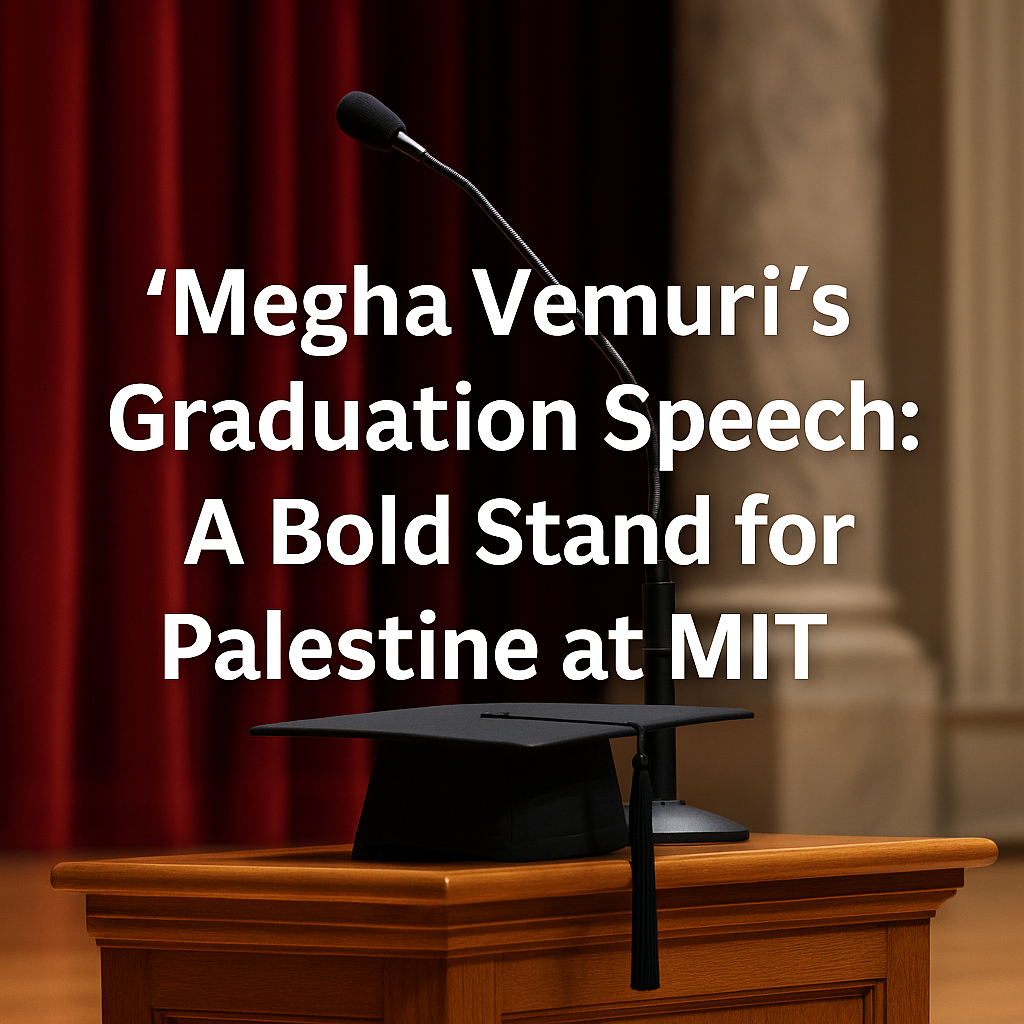MIT Class President Megha Vemuri’s pro-Palestine graduation speech ignites controversy, highlighting university ties to Israel and sparking global discussions on academic freedom.
Megha Vemuri’s Graduation Speech: A Bold Stand for Palestine at MIT
At the Massachusetts Institute of Technology’s (MIT) 2025 commencement ceremony, Class President Megha Vemuri delivered a speech that resonated far beyond the university’s halls. Her address, which criticized Israel’s actions in Gaza and MIT’s affiliations with Israeli defense entities, sparked both applause and outrage, igniting a global conversation on academic freedom, political expression, and institutional responsibility.
A Graduation Speech That Echoed Worldwide
Wearing a red keffiyeh—a symbol of Palestinian solidarity—Vemuri took the stage to deliver a speech that diverged from the approved script. She accused Israel of attempting to “wipe Palestine off the face of the earth” and condemned MIT’s ties with the Israeli military, particularly highlighting collaborations with defense firm Elbit Systems .
“Right now, while we prepare to graduate and move forward with our lives, there are no universities left in Gaza,” Vemuri stated, drawing attention to the destruction of educational institutions in the region
MIT’s Response and the Aftermath
Following her speech, MIT officials barred Vemuri and her family from attending the undergraduate commencement ceremony the next day. Chancellor Melissa Nobles cited a violation of the university’s “time, place, and manner” policies, stating that Vemuri had misrepresented her intended remarks
In response, Vemuri criticized the university’s actions as an overreach, asserting her right to free expression and challenging the notion that her speech constituted a protest .
Public Reaction: A Nation Divided
Vemuri’s speech and subsequent disciplinary actions by MIT sparked a polarized response.
Support and Solidarity
- Student Activists: Many student groups and activists praised Vemuri for her courage, viewing her speech as a necessary stand against perceived injustices.
- Academic Circles: Some academics defended her right to free speech, emphasizing the importance of universities as spaces for open discourse.
Criticism and Backlash
- Jewish Students and Organizations: Some Jewish students walked out during the speech, perceiving it as an attack on their identity and beliefs .
- Online Harassment: Vemuri faced significant online trolling, with critics labeling her a “woke Hindu” and questioning her motives .
The Broader Implications
Vemuri’s speech has reignited debates on several fronts:
- Academic Freedom: The incident raises questions about the limits of free speech in academic settings and the role of universities in moderating political discourse.
- Institutional Accountability: Her remarks spotlight the ethical considerations of university affiliations with defense and military organizations.The Times of India
- Student Activism: The event underscores the growing influence of student voices in shaping institutional policies and public opinion.
Conclusion: A Catalyst for Change?
Megha Vemuri’s graduation speech serves as a poignant reminder of the power of individual voices in challenging established norms. Whether one agrees with her stance or not, her actions have sparked essential conversations about the role of academic institutions in global conflicts, the boundaries of free expression, and the responsibilities of students and universities alike.
Call to Action: Engage in the conversation. Share your thoughts on academic freedom, institutional responsibility, and the role of student activism in today’s world.
📌 “Watch the Full Speech by Megha Vemuri”
Below is the original video published by The Times of India on YouTube.


0 Comment